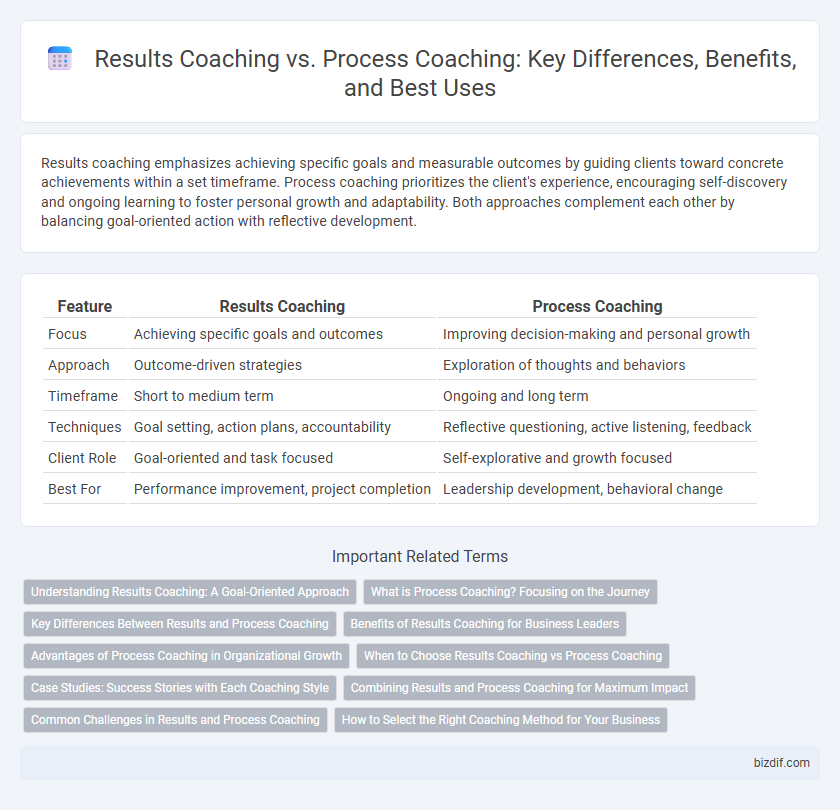Results coaching emphasizes achieving specific goals and measurable outcomes by guiding clients toward concrete achievements within a set timeframe. Process coaching prioritizes the client's experience, encouraging self-discovery and ongoing learning to foster personal growth and adaptability. Both approaches complement each other by balancing goal-oriented action with reflective development.
Table of Comparison
| Feature | Results Coaching | Process Coaching |
|---|---|---|
| Focus | Achieving specific goals and outcomes | Improving decision-making and personal growth |
| Approach | Outcome-driven strategies | Exploration of thoughts and behaviors |
| Timeframe | Short to medium term | Ongoing and long term |
| Techniques | Goal setting, action plans, accountability | Reflective questioning, active listening, feedback |
| Client Role | Goal-oriented and task focused | Self-explorative and growth focused |
| Best For | Performance improvement, project completion | Leadership development, behavioral change |
Understanding Results Coaching: A Goal-Oriented Approach
Results Coaching emphasizes setting clear, measurable goals and driving clients toward achieving specific outcomes within a defined timeframe. This goal-oriented approach prioritizes tangible success indicators, leveraging strategic planning and accountability to maximize performance. Coaches facilitate focused action steps that align with the client's desired results, ensuring continuous progress and achievement.
What is Process Coaching? Focusing on the Journey
Process coaching emphasizes the journey by guiding clients through their thought patterns, behaviors, and decision-making processes to foster self-awareness and sustainable growth. This approach prioritizes the development of skills and mindset shifts rather than immediate outcomes, enabling clients to navigate challenges effectively. By focusing on the ongoing journey, process coaching cultivates long-term transformation and resilience.
Key Differences Between Results and Process Coaching
Results coaching centers on achieving specific, measurable goals within a defined timeframe, emphasizing clarity, accountability, and outcome-driven strategies. Process coaching prioritizes the client's personal growth and self-awareness through exploring thoughts, feelings, and behaviors, fostering long-term transformation and resilience. Key differences include results coaching's focus on goal attainment versus process coaching's emphasis on ongoing development and adaptive learning.
Benefits of Results Coaching for Business Leaders
Results Coaching accelerates goal achievement by providing business leaders with clear metrics and actionable strategies that drive measurable outcomes. Emphasizing accountability and performance, this approach enhances decision-making and boosts productivity in high-stakes environments. Business leaders benefit from increased focus on end goals, leading to improved profitability and sustained competitive advantage.
Advantages of Process Coaching in Organizational Growth
Process Coaching enhances organizational growth by fostering continuous improvement and adaptability, enabling teams to develop problem-solving skills and resilience in dynamic environments. It emphasizes learning and collaboration, leading to sustainable change and stronger employee engagement compared to Results Coaching's focus on immediate outcomes. This approach cultivates innovation and long-term value by aligning individual development with organizational goals.
When to Choose Results Coaching vs Process Coaching
Choose Results Coaching when the primary goal is to achieve specific, measurable outcomes such as sales targets, project completions, or leadership milestones, as it prioritizes goal attainment and accountability. Opt for Process Coaching to improve underlying skills, behaviors, or mindsets, especially when navigating complex challenges, fostering personal development, or enhancing team dynamics. Results Coaching accelerates performance by focusing on end-goals, while Process Coaching builds long-term capacity through reflection and learning.
Case Studies: Success Stories with Each Coaching Style
Case studies reveal how Results Coaching drives measurable achievements by setting clear goals and accountability benchmarks, leading to rapid performance improvements in corporate sales teams. In contrast, Process Coaching emphasizes long-term development through reflective practices and skill-building, demonstrated by improved leadership capabilities in healthcare management programs. Both coaching styles yield success by aligning methodologies with client needs, showcased by increased productivity metrics and enhanced decision-making processes in diverse industries.
Combining Results and Process Coaching for Maximum Impact
Combining results coaching with process coaching enhances overall effectiveness by addressing both goal achievement and the behaviors driving those outcomes. Results coaching focuses on setting clear objectives and measuring success, while process coaching emphasizes developing mindset, skills, and habits that support sustained progress. Integrating these approaches creates a balanced coaching strategy that maximizes impact through actionable insights and continuous improvement.
Common Challenges in Results and Process Coaching
Results Coaching often faces challenges such as setting overly ambitious goals and maintaining motivation when progress stalls, which can lead to frustration and dropout. Process Coaching typically struggles with helping clients stay focused on the learning journey while balancing the need for measurable outcomes, causing confusion about progress. Both coaching types require managing client expectations and fostering consistent accountability to achieve sustainable growth.
How to Select the Right Coaching Method for Your Business
Selecting the right coaching method for your business hinges on understanding your organizational goals and employee needs; Results Coaching targets specific performance outcomes, ideal for measurable objectives and short-term improvements. Process Coaching emphasizes ongoing development and skill-building, fostering long-term growth and adaptability within your team. Analyze your company's priorities and the nature of challenges to determine whether a results-driven or process-oriented coaching approach will deliver maximum impact.
Results Coaching vs Process Coaching Infographic

 bizdif.com
bizdif.com